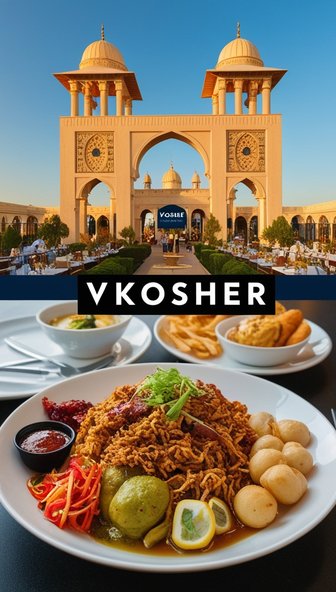Understanding Kosher Knives: A Comprehensive Guide
Kosher knives are an essential part of Jewish culinary tradition, where the dietary laws, known as kashrut, dictate not only what foods can be eaten but also how they must be prepared. These laws are derived from the Torah and are fundamental to maintaining a kosher kitchen. Among the many tools and utensils used in a kosher kitchen, knives hold a particular significance. They are not just ordinary kitchen tools; they are imbued with spiritual importance and are meticulously handled to ensure that they adhere to the strict guidelines of kashrut.
The Role of Kosher Knives in Jewish Tradition
In the Jewish tradition, food preparation is not just about cooking; it is a religious act that connects individuals to their faith and community. Kosher knives play a crucial role in this process, as they are used to prepare foods that must meet specific dietary standards. These standards are not merely about what is consumed but how it is prepared, ensuring that every step aligns with the religious laws.
Kosher knives are primarily used for the slaughtering of animals, a process known as shechita, which must be performed by a trained individual called a shochet. The knife used in shechita, known as a chalaf, is specially designed and must be perfectly smooth, without any nicks or imperfections, to ensure that the slaughter is as humane as possible. The blade must be long and sharp enough to cut through the animal’s throat with a single motion, minimizing pain and distress.
The Importance of Knife Maintenance in a Kosher Kitchen
Maintaining kosher knives is a meticulous process that reflects the broader commitment to upholding kashrut. Knives must be kept separate for different types of foods—specifically for meat and dairy—because mixing these two is strictly prohibited in kosher law. This separation extends to all kitchen utensils and surfaces, but knives, given their direct contact with food, are particularly scrutinized.
In a kosher kitchen, there are usually at least two sets of knives: one for meat and one for dairy. Some households may even have a third set for pareve foods, which are neutral and can be eaten with either meat or dairy. The knives must be clearly marked or stored separately to avoid any chance of cross-contamination. If a knife is accidentally used for the wrong type of food, it must undergo a rigorous kashering process, which may involve heating or other purification methods, depending on the severity of the contamination.
The Process of Kashering Knives
Kashering, or making utensils kosher, is a process that can vary in complexity depending on the utensil and the type of contamination. For knives, the process generally involves thoroughly cleaning the blade and then heating it to a specific temperature. This is often done by plunging the knife into boiling water or heating it with a blowtorch, a method known as libun. The heat is intended to purge any non-kosher residue that may have been absorbed into the metal.
If a knife has been used inappropriately—for instance, a meat knife used to cut dairy—it cannot simply be washed and reused. The kashering process is mandatory to restore its kosher status. Some materials, such as stainless steel, are more easily kashered than others. However, knives with wooden handles or other materials that may absorb food particles can present a greater challenge and may sometimes need to be replaced altogether.
Selecting Kosher Knives: What to Consider
When selecting knives for a kosher kitchen, there are several factors to consider. The first is the material of the blade. Stainless steel is the most common choice because it is durable, easy to clean, and less likely to absorb food particles. The blade should also be smooth and free from any nicks or dents, as even a small imperfection can trap food and make the knife difficult to kasher.
The handle is another important consideration. Ideally, the handle should be made of a non-porous material that does not absorb liquids or food particles. Many kosher households prefer knives with plastic or metal handles because they are easier to clean and kasher. Wooden handles, while traditional, can be problematic because wood can absorb moisture and food particles, making it difficult to maintain the knife’s kosher status.
The design of the knife is also important. For example, a knife with a serrated edge is more difficult to kasher because food particles can become trapped in the serrations. For this reason, many kosher kitchens prefer straight-edged knives, which are easier to clean and maintain.
The Spiritual Significance of Kosher Knives
Beyond their practical use in food preparation, kosher knives carry spiritual significance in the Jewish faith. The careful attention given to the maintenance and use of these knives reflects a broader commitment to living a life in accordance with Jewish law. In this way, even the act of preparing food becomes a form of worship, a way of sanctifying the mundane and elevating it to a spiritual level.
The chalaf, used in the shechita process, is particularly symbolic. It represents the shochet’s dedication to performing their duty with precision and compassion, adhering to the strictest standards of kashrut. The process of shechita itself is seen as a mitzvah, a commandment from God, and the chalaf is the tool through which this mitzvah is fulfilled. Therefore, the maintenance and use of kosher knives are not just about following rules but about participating in a spiritual tradition that has been passed down through generations.
Modern Challenges and Innovations in Kosher Knives
In today’s world, where technology and culinary practices are constantly evolving, maintaining a kosher kitchen can present new challenges. For example, the advent of new materials and designs in kitchenware means that not all knives are easily kashered. Some modern knives are made with materials that do not respond well to traditional kashering methods, such as those with composite or ceramic blades. These materials may require alternative methods or even make the knives unsuitable for use in a kosher kitchen.
Another modern challenge is the mass production of kitchen knives. In the past, many kosher households relied on handmade knives, which were easier to inspect for nicks and imperfections. Today, with knives being mass-produced, it can be harder to ensure that a new knife is perfectly smooth and free of defects. This has led some kosher households to invest in higher-end knives that are carefully crafted and easier to maintain.
Despite these challenges, there have also been innovations that make maintaining a kosher kitchen easier. For example, some manufacturers now produce knives specifically designed for kosher kitchens, with features like color-coded handles to distinguish between meat and dairy knives. Others have developed knives with detachable blades, which can be more easily cleaned and kashered.
Conclusion: The Enduring Tradition of Kosher Knives
Kosher knives are more than just kitchen tools; they are an integral part of Jewish tradition and practice. The care and attention given to their use and maintenance reflect a deep commitment to kashrut and to the broader spiritual values of the Jewish faith. Whether used in the sacred act of shechita or in the everyday preparation of food, kosher knives serve as a reminder of the importance of following Jewish law and living a life of integrity and devotion.
As modern technology and culinary practices continue to evolve, the principles that govern the use of kosher knives remain steadfast. They are a testament to the enduring nature of Jewish tradition, which continues to adapt to new challenges while remaining rooted in the timeless teachings of the Torah. In this way, kosher knives symbolize the ongoing connection between the past and the present, between tradition and innovation, and between the physical and the spiritual.




